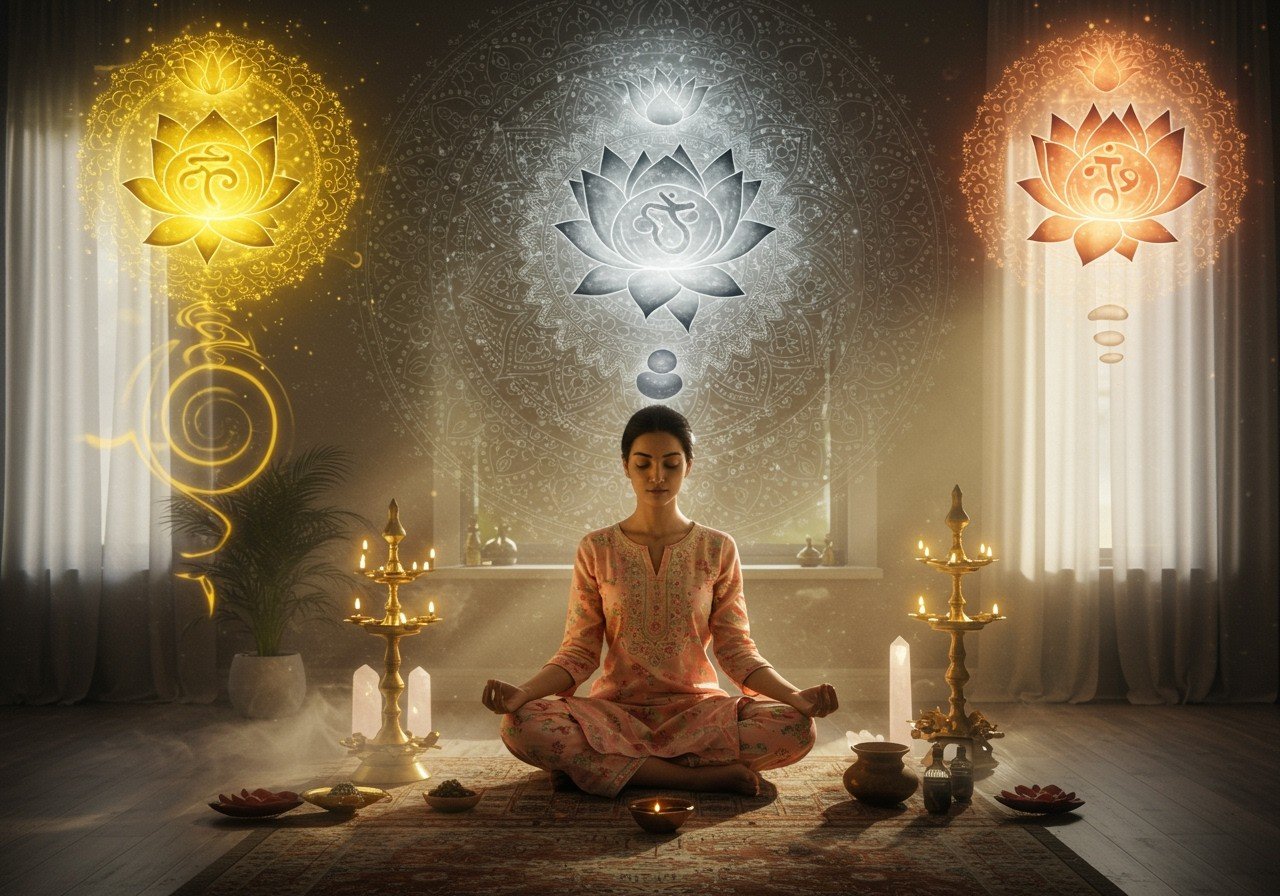
In today’s fast-paced world, maintaining a spiritual connection is essential for inner peace and balance. Daily puja offers a powerful way to honor Hindu goddesses and cultivate a deeper sense of reverence. It allows devotees to connect with the divine, fostering tranquility and positive energy in their lives. For those seeking guidance, resources like this guide on Hindu fasting can provide valuable insights into spiritual practices.
Significance of Daily Puja
Daily puja holds profound significance for Hindus. It’s a pathway to connect with the divine, fostering a sense of closeness and reverence for the goddesses. Beyond the spiritual connection, it purifies the mind, clearing away negative thoughts and fostering inner peace and focus. Daily puja also invites positive energy into the home, creating a harmonious atmosphere. By dedicating this time, individuals reinforce their faith and maintain spiritual discipline. It’s a symbolic offering of one’s mind, body, thoughts, actions, and possessions to the goddess, expressing deep devotion and gratitude.
Preparing for Puja
Proper preparation is crucial for a meaningful puja experience. Consider these essential aspects:
- Ideal Timing: Early morning, when the mind is calm and focused, is generally considered the best time for puja. Some practitioners also suggest performing it thrice a day, fostering a continuous connection with the divine. For insights into setting up a sacred space, see our guide on creating a puja altar.
- Cleanliness: Personal and environmental purity are important for puja. Begin by taking a bath and wearing clean, fresh clothes. Thoroughly clean the designated worship area, removing dust and dirt to maintain a sacred atmosphere. For all your puja needs, explore our diverse collection of cotton wicks, incense, and other essential items at poojn.in.
- Setting up the Altar: Designate a specific area for worship – a separate room, a quiet corner, or even a dedicated shelf. Place the picture or idol of the chosen goddess on a clean pedestal. Decorate the altar with fresh garlands, ornaments, and other symbolic items. Any clean and respectful space can be used. Learn more about temple etiquette and rituals for additional guidance.
Steps for Daily Puja
Performing daily puja involves a series of steps, each carrying symbolic meaning:
- Invocation (Avahan): Begin by meditating on the chosen deity, visualizing her presence. Invite the goddess to the altar with reverence, chanting mantras and offering fragrant flowers. Deepen your understanding of mantras with this informative resource on their power and purpose.
- Offering a Seat (Aasan): Offer a symbolic seat to the goddess by placing fresh flowers or leaves on the altar. This gesture signifies respect and welcomes the deity’s presence. You can find beautiful flower garlands and other puja essentials at poojn.in.
- Washing (Padya & Arghya): Offer water to symbolically wash the deity’s feet (Padya) and hands (Arghya), signifying purification and respect. For clay idols, sprinkle water gently. If using a picture, wipe it respectfully with a clean, dry cloth beforehand. High-quality puja accessories are available at poojn.in.
- Clothing (Vastra): Offer clean, preferably cotton, clothes to the deity. This gesture symbolizes adorning the goddess with reverence and devotion. Explore poojn.in for a wide selection of puja items.
- Scent (Gandha): Apply sandalwood paste or perfume to the deity using your ring finger. This offering symbolizes purity and devotion. Poojn.in offers a variety of fragrances suitable for puja.
- Flowers (Pushpa): Offer fresh, vibrant flowers to the deity as a symbol of love and devotion. Poojn.in provides fresh flower offerings in select locations.
- Incense (Dhoop): Light an incense stick and gently wave it around the altar, spreading the fragrant smoke. This act symbolizes purification and reverence. Explore our selection of incense sticks and other puja essentials at poojn.in.
- Lamp (Deep): Light an oil or ghee lamp, signifying the illumination of knowledge and the dispelling of darkness. Find high-quality diyas and lamp oil at poojn.in.
- Food Offering (Naivedya): Offer a portion of prepared food—cooked rice, fruits, or sweets—to the deity. This symbolizes sharing the fruits of your labor and expressing gratitude. You can find everything you need for a complete puja at poojn.in.
- Prayers (Prarthana): Recite mantras, sing hymns, or offer heartfelt personal prayers to the goddess. The Durga Saptashati, a powerful hymn dedicated to Goddess Durga, is often recited during Durga Puja. For more information on Hindu gods and goddesses, visit this comprehensive guide.
- Final Steps: Conclude the puja by bowing down and offering homage to the goddess. Chant mantras dedicated to the deity, expressing gratitude and seeking blessings. You can find a range of resources on Goddess Lakshmi and other deities at poojn.in.
Embracing Puja in Modern Life
In today’s busy world, adapting ancient traditions to modern lifestyles is essential. Daily puja offers a grounding practice, helping individuals maintain spiritual balance amidst daily demands. By incorporating these rituals into our routines, we create a sacred space in our homes and hearts, fostering a deeper connection with the divine. Poojn.in provides a convenient way to acquire authentic puja items, empowering individuals to maintain these traditions with ease and reverence. Their offerings, ranging from Saraswati Puja kits to Laddu Gopal murtis, cater to diverse needs. Explore their website for more puja essentials.
Understanding the Tridevi
While the term “Tridasha” typically refers to a group of thirty deities, the concept of three principal goddesses – often referred to as the Tridevi – holds great significance. These goddesses are Saraswati, Lakshmi, and Parvati (or Durga). Each embodies essential aspects of life:
- Saraswati: The goddess of knowledge, wisdom, arts, and music. She represents learning, creativity, and spiritual enlightenment. Learn more about Devi Saraswati.
- Lakshmi: The goddess of wealth, prosperity, fortune, and abundance. She embodies material and spiritual well-being. Explore our blog post on Goddess Lakshmi.
- Parvati (Durga): The goddess of power, strength, devotion, and protection. She represents divine energy and the triumph of good over evil. Learn more about Maa Durga and Maa Kali.
While not traditionally part of the “Tridasha,” these three goddesses are often honored together in daily puja and during specific festivals like Navratri. Understanding their individual significance deepens the meaning of worship and strengthens the devotee’s connection to the divine feminine.
What is Tridasha?
The term “Tridasha” typically refers to the thirty deities in Hindu mythology, representing various aspects of the cosmos and divine forces. However, it’s often confused with the Tridevi. These deities play an important role in different rituals and practices, providing guidance and blessings to devotees. They are often invoked during ceremonies and festivals, adding depth to the spiritual experience.
How does Tridasha influence Hindu rituals?
The Tridasha, as a broader concept of thirty deities, influences Hindu rituals by providing a diverse pantheon of divine beings to invoke for specific purposes. Each deity represents unique qualities and powers, allowing devotees to connect with the divine energy most relevant to their needs and aspirations. They are honored through specific mantras, offerings, and practices, enriching the tapestry of Hindu rituals.
Are there specific mantras dedicated to Tridasha?
Yes, specific mantras are associated with individual deities within the Tridasha. These mantras are recited during rituals to invoke the presence and blessings of those specific deities. The practice of chanting these mantras is believed to create a resonant connection with the divine energies they represent.
Why are Tridasha/Tridevi rituals important in daily life?
Daily rituals dedicated to the Tridasha or the Tridevi are important for maintaining a strong connection with the divine. They provide a framework for spiritual discipline, fostering inner peace, gratitude, and a sense of purpose. By engaging in these practices daily, devotees seek to invite positive energies into their lives and cultivate a deeper understanding of their spiritual path.
Can I perform Tridasha/Tridevi rituals at home?
Yes, many Tridasha/Tridevi rituals are adapted for home practice. This accessibility enables individuals to maintain their spiritual connection and honor the deities within the comfort of their homes. By creating a designated space for worship, individuals can establish a sacred sanctuary for daily devotion.
What items are needed for Tridasha/Tridevi rituals?
The items needed for Tridasha/Tridevi rituals vary depending on the specific deity and practice. Common items include incense, flowers, a diya (lamp), offerings like fruits and sweets, and sacred texts or mantras. Poojn.in offers a wide array of puja items to facilitate these practices.
How often should Tridasha/Tridevi rituals be performed?
The frequency of Tridasha/Tridevi rituals depends on individual preference and tradition. Some practitioners perform them daily, while others reserve them for special occasions, festivals, or specific days of the week associated with the deity.
Where can I learn more about Tridasha/Tridevi practices?
Information on Tridasha/Tridevi practices can be found in religious texts, through guidance from spiritual leaders, and by participating in community events. Online resources and educational courses also offer valuable insights into these practices.


